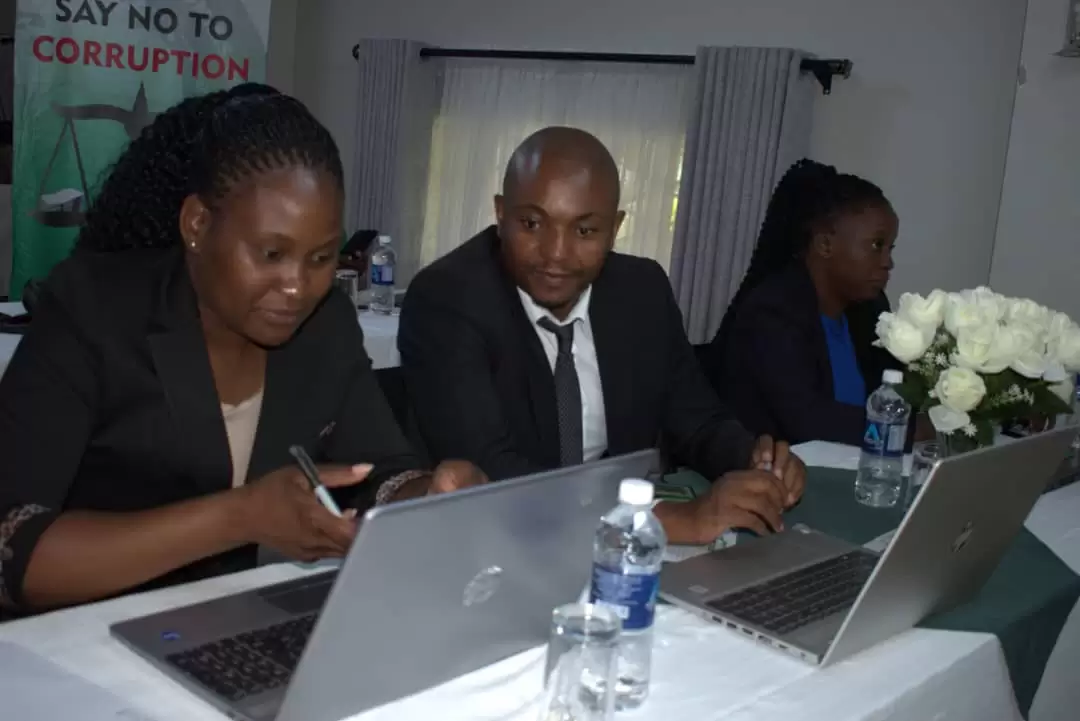By James Muonwa l Mashonaland West Correspondent
KEY stakeholders in the fight against endemic corruption are meeting in Kariba to gauge how Zimbabwe is faring on anti-graft indicators as set out in the Southern African Development Community (SADC) anti-corruption monitoring and evaluation framework.
The workshop, which kicked off Monday, comprises of participants from the Ministry of Justice, Public Service Commission (PSC), Zimbabwe Anti-Corruption Commission (ZACC), Judicial Service Commission (JSC), National Prosecuting Authority (NPA), and Zimbabwe Republic Police (ZRP).
Other attendees are drawn from the Zimbabwe Revenue Authority (ZIMRA) Attorney General (AG)’s Office, Financial Intelligence Unit (FIU), Asset Management Unit (AMU), Transparency International Zimbabwe (TIZ), Legal Resources Foundation, Accountability Lab, Zimbabwe Women Against Corruption Trust (ZWACT), and Zimbabwe Coalition on Debt and Development (ZIMCODD).
Speaking during the official opening of the workshop, ZACC monitoring and evaluation manager, Sifikile Moyo expressed the country’s commitment to ending corruption.
“It is my honour and privilege to address you all as we gather today to prepare the SADC Regional Anti-Corruption Monitoring and Evaluation Framework and Regional Anti-Corruption Assessment Reports.
“This workshop brings together focal persons from various institutions within the anti-corruption value chain, reflecting a collective commitment to fight corruption and strengthen governance in our region,” Moyo said.
She highlighted that the indaba, with participants from public institutions and civil society, aligns with the SADC Protocol Against Corruption, which was adopted by SADC Heads of State and Government and entered into force in July 2005.
Article 11 of the SADC protocol against corruption provides for the establishment of a committee consisting of State Parties as the vehicle to oversee the implementation of the protocol.
“Therefore, the SADC Anti-Corruption Committee (SACC) was established in 2015. In order to operationalise the objectives of committee SADC Strategic Anti-Corruption Action Plan (2023-2027), which defined strategic priorities for action aligned to the objectives of the SADC protocol.
“This led to the establishment of the SADC Regional Anti-Corruption Monitoring and Evaluation Framework, which was approved by the Ministerial Committee of the Organ Meeting of July 2022.
“This framework serves as a vital mechanism to monitor and track the progress of Member States in addressing corruption and assessing the impact of these efforts.
“By gathering here, we fulfil an essential aspect of the framework—collaboratively contributing to the Annual Data Reporting Template for Key Indicators,” added Moyo.
The framework has 17 Key indicators tracked in the region for the past three years. Zimbabwe is one of the complaint Member States, which is in the second year of conducting the critical exercise.
“The reports will provide valuable insights into the strides we are making as a country under Outcome 2 of the Regional Strategic Indicative Development Plan (2020–2030), which envisions consolidated democracy and inclusive governance.
“It will also reflect progress in the implementation of the SADC Protocol against Corruption, reinforcing our collective efforts to meet its objectives.
“As ZACC, we recognise the interconnectedness of our work with other institutions and the importance of fostering collaboration across the anti-corruption value chain.
“The role of focal persons in this regard is indispensable, as they provide the crucial link between various authorities and agencies. The workshop’s deliberations will ensure that the data we present is comprehensive, accurate, and reflective of the multi-faceted approach required to combat corruption effectively.
“As we begin our work, let us keep in mind that our contributions today will shape regional anti-corruption strategies and provide actionable insights to advance the fight against corruption in our respective countries.”
Moyo underscored the need to create a region where integrity is not just a value but a way of life.
“Let us be meticulous, collaborative, and focused, knowing that the outcomes of our efforts will enhance transparency, accountability, and governance across the SADC region. Together, we can build a region where integrity is not just a value but a way of life,” Moyo said.
